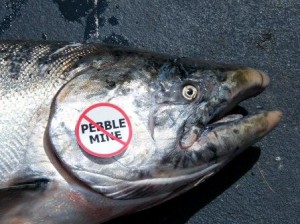Part I yesterday discussed the free flow of oil into the Gulf of Mexico when the BP well ruptured, and the disastrous consequences for shellfish and seafood. Today, the next frontier.
Chef Kevin Davis is also at the forefront of another environmental battle, 1,600 miles in the opposite direction. Bristol Bay, some 200 miles southwest of Anchorage and surrounded by thousands of square miles of Alaskan tundra, is "home" to half the world's wild sockeye salmon: some 60 million animals pass through the bay enroute to their spawning grounds. It's a majestic landscape, inhabited only by a handful of native villages. Except for the salmon fishery, out on the treacherous waters, there's no industry. "Vote with your fork," says the promotional literature in a dozen Seattle restaurants that serve Bristol Bay salmon.
 Enter the developers in the form of Northern Dynasty, parent company of mining project called the Pebble Partnership. A wealth of minerals lies beneath the tundra, and Pebble wants it. Gold, copper, molybdenum silver, rhenium, palladium. The land was opened to mining in the waning days of the Bush administration, and the project had the enthusiastic support of Alaska's former governor, Sarah Palin. Trouble is, getting at the riches would require a vast open-pit mine, the world's biggest, on the headwaters of Bristol Bay. The pit would measure 15 miles across; the dam to hold back the mine's toxic tailings would be 700 feet high and 4.5 miles across, the world's most massive, bigger than the 3 Rivers dam in China, and built on a seismic fault.
Enter the developers in the form of Northern Dynasty, parent company of mining project called the Pebble Partnership. A wealth of minerals lies beneath the tundra, and Pebble wants it. Gold, copper, molybdenum silver, rhenium, palladium. The land was opened to mining in the waning days of the Bush administration, and the project had the enthusiastic support of Alaska's former governor, Sarah Palin. Trouble is, getting at the riches would require a vast open-pit mine, the world's biggest, on the headwaters of Bristol Bay. The pit would measure 15 miles across; the dam to hold back the mine's toxic tailings would be 700 feet high and 4.5 miles across, the world's most massive, bigger than the 3 Rivers dam in China, and built on a seismic fault.
Davis, along with Seth Caswell of Emmer & Rye (and head of the Seattle Chefs Collaborative), is worried about the threats the mine would pose to Alaska's native culture. John Shively, on the other hand, ceo of the Pebble Partnership, says the chefs don't understand the project or appreciate what it could do for the people of the region. Going a step further, a former Alaska legislator, Gail Phillips, last year called for a boycott of the Seattle restaurants supporting Bristol Bay. In response, Zach Lyons, spokesman for a group of Seattle farmers markets, said, "Just because no permits have been issued or applied for, does not mean people concerned with the potential of this proposed mine should not already be taking action. Once permits start happening with mine projects, it is often too late."
Tomorrow: the threat, remote though it may be, of "radioactive" wine.
Leave a comment